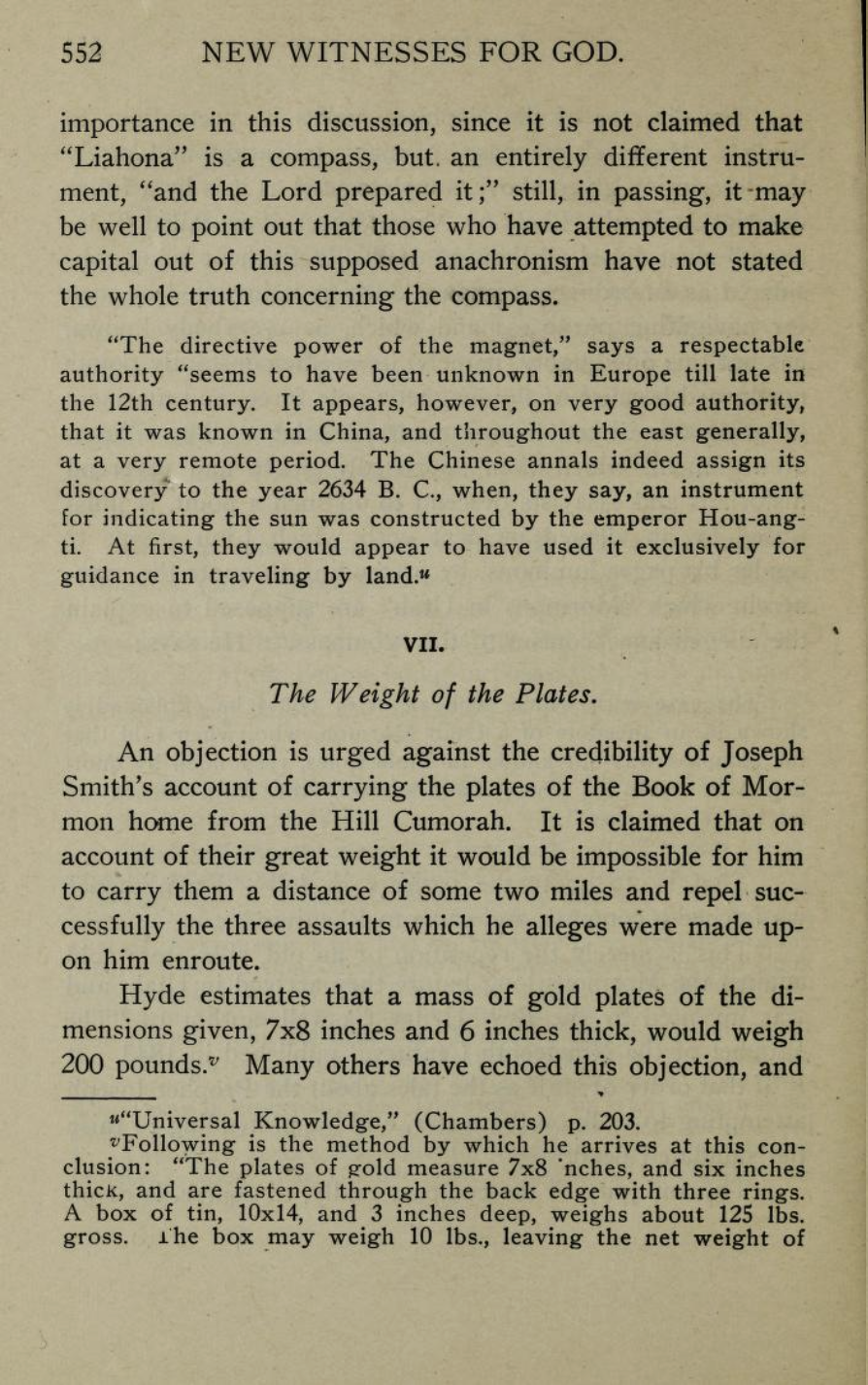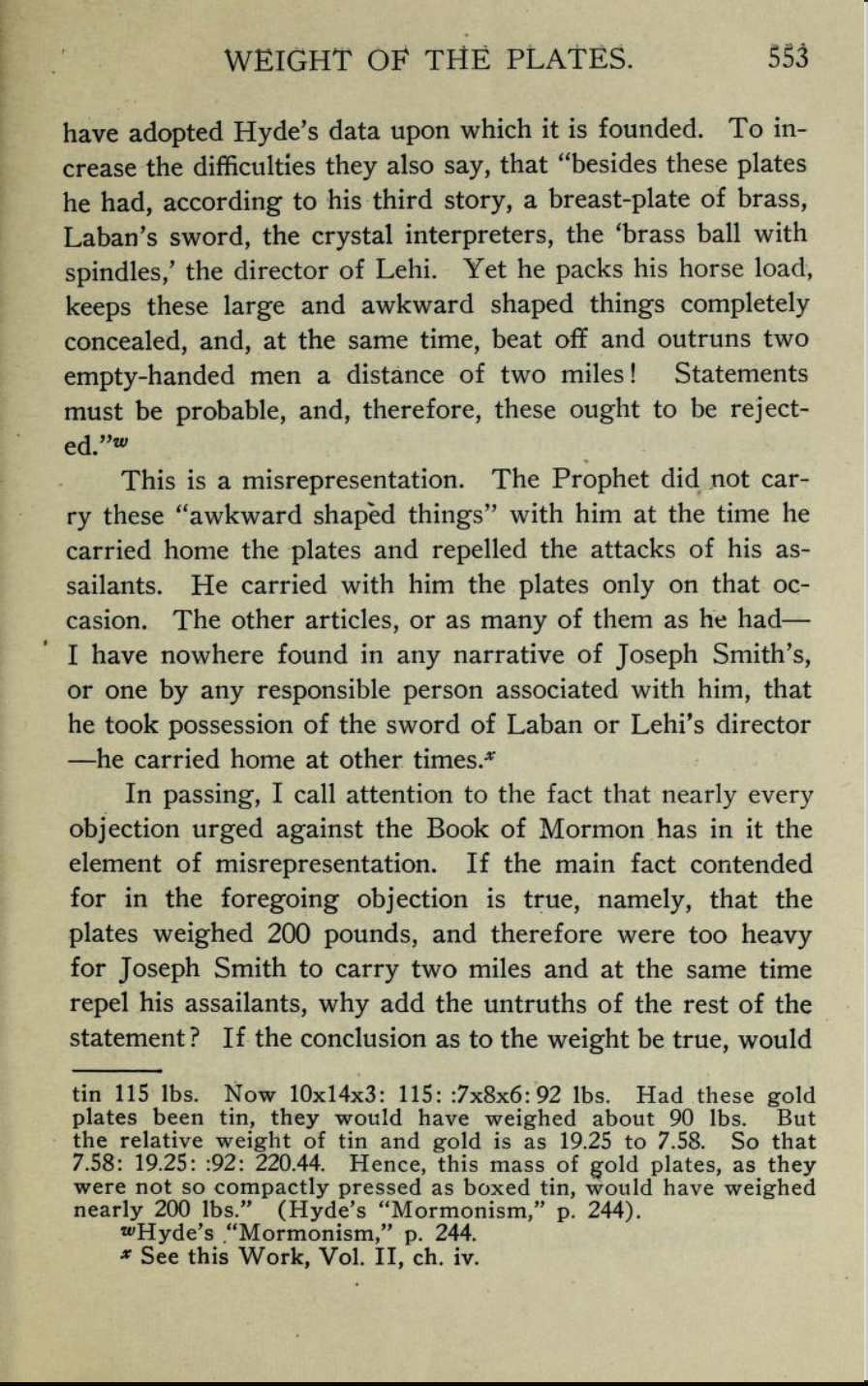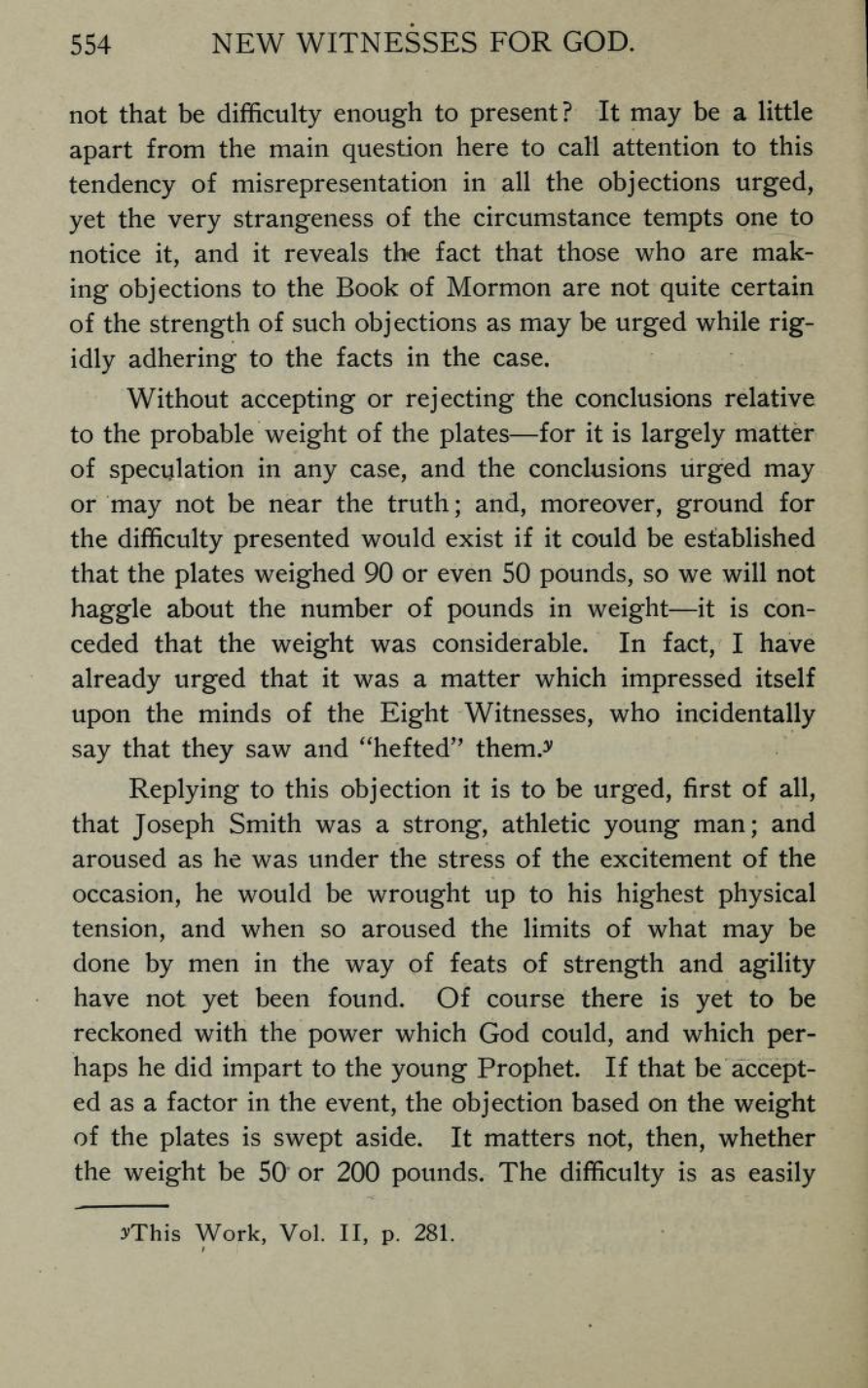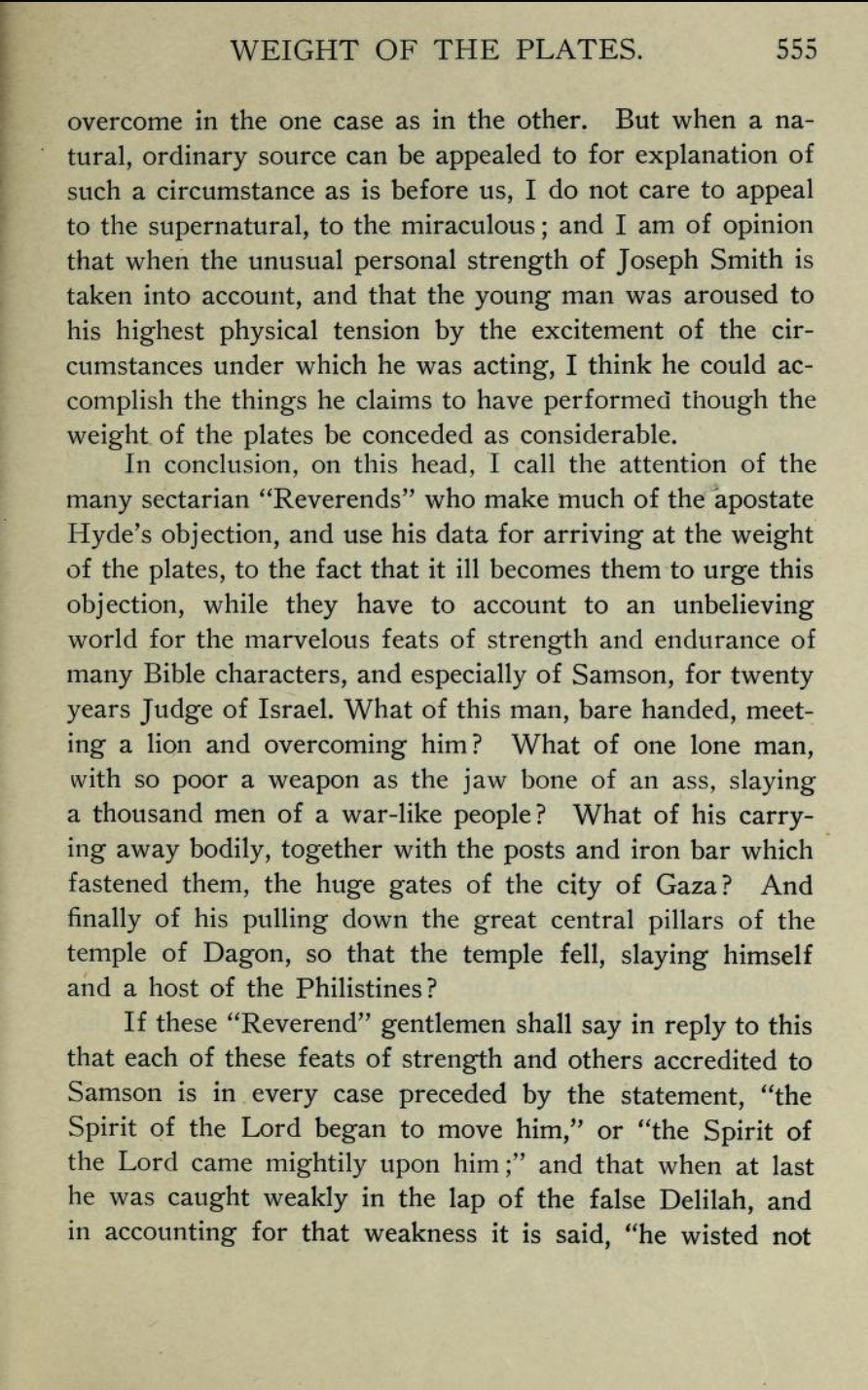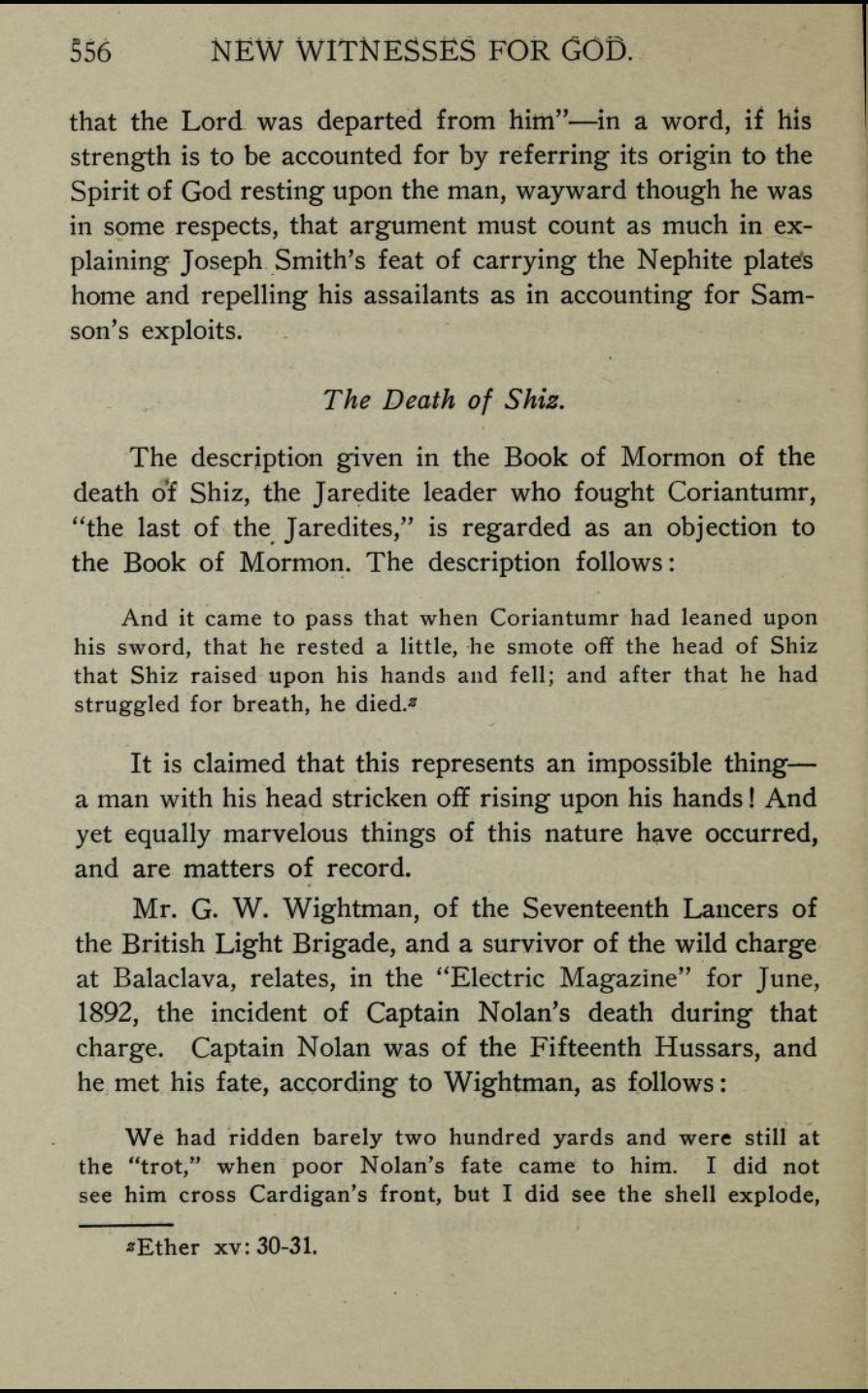Roberts responds to criticism that the plates were too heavy.
- Type
- Book
- Hearsay
- DirectSecondary
- Reference
B. H. Roberts, New Witnesses for God. II. The Book of Mormon. In Three Volumes. Vol. III (Salt Lake City, UT: The Deseret News, 1909), 552–556
- Scribe/Publisher
- Deseret News
- Audience
- Reading Public
- Transcription
An objection is urged against the credibility of Joseph Smith's account of carrying the plates of the Book of Mormon home from the Hill Cumorah. It is claimed that on account of their great weight it would be impossible for him to carry them a distance of some two miles and repel successfully the three assaults which he alleges were made upon him enroute.
Hyde estimates that a mass of gold plates of the dimensions given, 7x8 inches and 6 inches thick, would weigh 200 pounds. Many others have echoed this objection, and have adopted Hyde's data upon which it is founded. To increase the difficulties they also say, that "besides these plates he had, according to his third story, a breast-plate of brass, Laban's sword, the crystal interpreters, the 'brass ball with spindles,' the director of Lehi. Yet he packs his horse load, keeps these large and awkward shaped things completely concealed, and, at the same time, beat off and outruns two empty-handed men a distance of two miles! Statements must be probable, and, therefore, these ought to be rejected."
This is a misrepresentation. The Prophet did not carry these "awkward shaped things" with him at the time he carried home the plates and repelled the attacks of his assailants. He carried with him the plates only on that occasion. The other articles, or as many of them as he had—I have nowhere found in any narrative of Joseph Smith's, or one by any responsible person associated with him, that he took possession of the sword of Laban or Lehi's director—he carried home at other times.
In passing, I call attention to the fact that nearly every objection urged against the Book of Mormon has in it the element of misrepresentation. If the main fact contended for in the foregoing objection is true, namely, that the plates weighed 200 pounds, and therefore were too heavy for Joseph Smith to carry two miles and at the same time repel his assailants, why add the untruths of the rest of the statement? If the conclusion as to the weight be true, would not that be difficulty enough to present? It may be a little apart from the main question here to call attention to this tendency of misrepresentation in all the objections urged, yet the very strangeness of the circumstance tempts one to notice it, and it reveals the fact that those who are making objections to the Book of Mormon are not quite certain of the strength of such objections as may be urged while rigidly adhering to the facts in the case.
Without accepting or rejecting the conclusions relative to the probable weight of the plates—for it is largely matter of speculation in any case, and the conclusions urged may or may not be near the truth; and, moreover, ground for the difficulty presented would exist if it could be established that the plates weighed 90 or even 50 pounds, so we will not haggle about the number of pounds in weight—it is conceded that the weight was considerable. In fact, I have already urged that it was a matter which impressed itself upon the minds of the Eight Witnesses, who incidentally say that they saw and "hefted" them.
Replying to this objection it is to be urged, first of all, that Joseph Smith was a strong, athletic young man; and aroused as he was under the stress of the excitement of the occasion, he would be wrought up to his highest physical tension, and when so aroused the limits of what may be done by men in the way of feats of strength and agility have not yet been found. Of course there is yet to be reckoned with the power which God could, and which perhaps he did impart to the young Prophet. If that be accepted as a factor in the event, the objection based on the weight of the plates is swept aside. It matters not, then, whether the weight be 50 or 200 pounds. The difficulty is as easily overcome in the one case as in the other. But when a natural, ordinary source can be appealed to for explanation of such a circumstance as is before us, I do not care to appeal to the supernatural, to the miraculous; and I am of opinion that when the unusual personal strength of Joseph Smith is taken into account, and that the young man was aroused to his highest physical tension by the excitement of the circumstances under which he was acting, I think he could accomplish the things he claims to have performed though the weight of the plates be conceded as considerable.
In conclusion, on this head, I call the attention of the many sectarian "Reverends" who make much of the apostate Hyde's objection, and use his data for arriving at the weight of the plates, to the fact that it ill becomes them to urge this objection, while they have to account to an unbelieving world for the marvelous feats of strength and endurance of many Bible characters, and especially of Samson, for twenty years Judge of Israel. What of this man, bare handed, meeting a lion and overcoming him? What of one lone man, with so poor a weapon as the jaw bone of an ass, slaying a thousand men of a war-like people? What of his carrying away bodily, together with the posts and iron bar which fastened them, the huge gates of the city of Gaza? And finally of his pulling down the great central pillars of the temple of Dagon, so that the temple fell, slaying himself and a host of the Philistines?
If these "Reverend" gentlemen shall say in reply to this that each of these feats of strength and others accredited to Samson is in every case preceded by the statement, "the Spirit of the Lord began to move him," or "the Spirit of the Lord came mightily upon him;" and that when at last he was caught weakly in the lap of the false Delilah, and in accounting for that weakness it is said, "he wisted not that the Lord was departed from him"—in a word, if his strength is to be accounted for by referring its origin to the Spirit of God resting upon the man, wayward though he was in some respects, that argument must count as much in explaining Joseph Smith's feat of carrying the Nephite plates home and repelling his assailants as in accounting for Samson's exploits.
- Citations in Mormonr Qnas
The B. H. Roberts Foundation is not owned by, operated by, or affiliated with the Church of Jesus Christ of Latter-day Saints.

